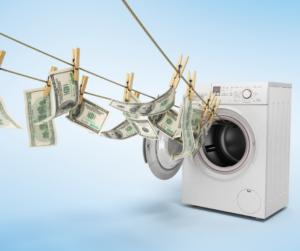 When criminals profit from illegal activities, they often need to “clean” or camouflage the proceeds of their crimes. Money laundering is the process of separating funds from illegal sources, such as theft, drug trafficking, or terrorism, and giving them the appearance instead that they are from legitimate sources. This makes it more difficult for authorities to locate clues and information, apprehend the criminals, and seize their assets.
When criminals profit from illegal activities, they often need to “clean” or camouflage the proceeds of their crimes. Money laundering is the process of separating funds from illegal sources, such as theft, drug trafficking, or terrorism, and giving them the appearance instead that they are from legitimate sources. This makes it more difficult for authorities to locate clues and information, apprehend the criminals, and seize their assets.
Money launderers frequently use unsuspecting small businesses to clean their tainted money. Businesses may also be coerced into cooperating with money laundering in some situations. Here are some things to keep in mind to protect your company from these criminals.
Three Stages
Money laundering typically consists of three stages:
- Placement. Criminals introduce their stolen funds into the economy, giving them the appearance of legitimacy. Strategies include dividing large sums into smaller amounts and depositing them into several accounts, including offshore accounts.
- Adding layers. The goal of layering is to establish a complex web of transactions that makes it difficult for law enforcement to identify funds as illegally sourced. Criminals may transfer funds into and out of accounts, invest in financial securities, buy and sell real estate, or establish shell companies to hide criminal proceeds.
- Integration. This is the stage at which thieves use or spend their newly “clean” money, which is frequently spent on luxury items and new business ventures.
These activities may take place with or without the involvement of a legitimate business owner or insider. However, if an accomplice is employed by the company and can facilitate transactions, it is significantly easier to launder money.
Common Business Targets
Any business can become involved in money laundering, but some are more vulnerable than others. Cash-intensive companies, such as bars and restaurants, are especially appealing to launderers since reconciling food and drink sales with inventory is often complicated and, as a result, easy to falsify. Because of the size and regularity of their transactions, real estate enterprises are also frequently used by money launderers. Similarly, due to the large fees in many contracts and the complexity of supply chains and billing methods, the construction business can readily be used to launder money.
Detection and Prevention
Closely monitoring your business’s transactions can reduce the risk of it being used for money laundering schemes. These schemes frequently begin with small financial transactions and then grow in scale if the culprits believe they have eluded detection. Examine transactions randomly and based on their frequency and dollar amounts. If you find a suspicious transaction, request an explanation from the staff involved and consider hiring a forensic accountant to investigate further.
It’s also crucial to understand your customers. Depending on the nature of your business, you may be able to store customer names, addresses, transactions, and other information in a database. For large transactions or contracts, engage a third party to perform a thorough background check on the parties. In general, the more information you have about your customers, the better.
Get to know your staff as well. Criminal gangs will occasionally infiltrate your companies with devious employees to facilitate their illegal transactions and falsify records. Conduct background checks on all potential employees. If a person’s employment history or interview raises concerns, investigate further before hiring that person.
Train current personnel to spot signs of money laundering. Provide examples of scenarios that could occur in your industry, and a confidential reporting option (such as an anonymous hotline) for employees to use if they notice something suspect.
Admit Risk
The first step toward preventing money laundering in your company is admitting that it is a threat. Then put safeguards in place to prevent it from happening. If you think your company might be being used for money laundering, contact your attorney right away. At HW&Co., our fraud experts can also help you investigate suspicions and collect evidence for prospective legal proceedings. Contact us to learn more.
© 2023

Prinicpal
Director, Fraud & Forensics
anthony.lanasa@hwco.cpa
Enjoy this article? Here are some others you may like:
Taxpayers: Be Aware of Scammers Posing as the IRS
Watch for These Small Business Fraud Schemes
How “Phoenix” Companies Abuse Bankruptcy Protection and Defraud Creditors




